Anarcho-communism, also known as anarchist communism, is a political philosophy and anarchist school of thought that advocates communism. It calls for the abolition of private property but retains respect for personal property and collectively-owned items, goods, and services. It supports social ownership of property and direct democracy among other horizontal networks for the allocation of production and consumption based on the guiding principle "From each according to his ability, to each according to his needs". Some forms of anarcho-communism, such as insurrectionary anarchism, are strongly influenced by egoism and radical individualism, believing anarcho-communism to be the best social system for realizing individual freedom. Most anarcho-communists view anarcho-communism as a way of reconciling the opposition between the individual and society.

Pyotr Alexeyevich Kropotkin was a Russian anarchist, socialist, revolutionary, historian, scientist, philosopher, and activist who advocated anarcho-communism.
Freedom is a London-based anarchist website and biannual journal published by Freedom Press which was formerly a monthly newspaper.

Freedom Press is an anarchist publishing house and bookseller in Whitechapel, London, United Kingdom. Founded in 1886, it is the largest anarchist publishing house in the country and the oldest of its kind in the English speaking world. It is based at 84b Whitechapel High Street in the East End of London.

Errico Malatesta was an Italian anarchist propagandist and revolutionary socialist. He edited several radical newspapers and spent much of his life exiled and imprisoned, having been jailed and expelled from Italy, England, France, and Switzerland. Originally a supporter of insurrectionary propaganda by deed, Malatesta later advocated for syndicalism. His exiles included five years in Europe and 12 years in Argentina. Malatesta participated in actions including an 1895 Spanish revolt and a Belgian general strike. He toured the United States, giving lectures and founding the influential anarchist journal La Questione Sociale. After World War I, he returned to Italy where his Umanità Nova had some popularity before its closure under the rise of Mussolini.
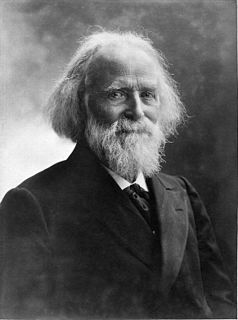
Jacques Élisée Reclus was a French geographer, writer and anarchist. He produced his 19-volume masterwork, La Nouvelle Géographie universelle, la terre et les hommes, over a period of nearly 20 years (1875–1894). In 1892 he was awarded the Gold Medal of the Paris Geographical Society for this work, despite having been banished from France because of his political activism.

Max Heinrich Hermann Reinhardt Nettlau was a German anarchist and historian. Although born in Neuwaldegg and raised in Vienna, he lived there until the anschluss to Nazi Germany in 1938. Max Nettlau retained his Prussian nationality throughout his life. A student of the Welsh language he spent time in London where he joined the Socialist League and met William Morris. While in London he met anarchists such as Errico Malatesta and Peter Kropotkin whom he remained in contact with for the rest of his life. He also helped to found Freedom Press for whom he wrote for many years.
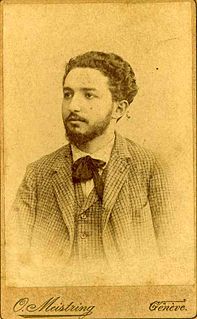
Alexander Movsesi Atabekian was a prominent Armenian anarchist, author and publisher of anarchist literature in Russian.
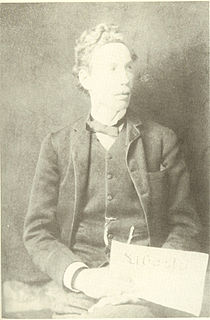
Thomas Hastie Bell (1867–1942) was a Scottish anarchist. He was born in Edinburgh in 1867.
The Manifesto of the Sixteen, or Proclamation of the Sixteen, was a document drafted in 1916 by eminent anarchists Peter Kropotkin and Jean Grave which advocated an Allied victory over Germany and the Central Powers during the First World War. At the outbreak of the war, Kropotkin and other anarchist supporters of the Allied cause advocated their position in the pages of the Freedom newspaper, provoking sharply critical responses. As the war continued, anarchists across Europe campaigned in anti-war movements and wrote denunciations of the war in pamphlets and statements, including one February 1916 statement signed by prominent anarchists such as Emma Goldman and Rudolf Rocker.
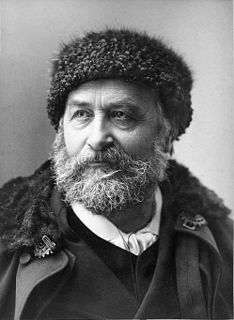
Élie Reclus was a French ethnographer and anarchist.
Anarchism in Romania developed in the 1880s within the larger Romanian socialist movement and it had a small following throughout all the existence of the Kingdom of Romania. Social anarchism was initially propagated by the Revista Ideei during the time of the Old Kingdom, but following the rise of Bolshevism, socialist tendencies were sidelined in favor of individualism and vegetarianism, which were the predominant anarchist tendencies in Romania during the 1920s and 1930s.

Alfred Marsh was an anarchist-communist and long-time editor and stalwart of the newspaper Freedom.
Louisa Sarah Bevington was an English anarchist, essayist and poet. Among those who attended her funeral was Peter Kropotkin.

Paul Reclus was a French anarchist.

Freie Arbeiter Stimme was a Yiddish-language anarchist newspaper published from New York City's Lower East Side between 1890 and 1977. It was among the world's longest running anarchist journals, and the primary organ of the Jewish anarchist movement in the United States; at the time that it ceased publication it was the world's oldest Yiddish newspaper. Historian of anarchism Paul Avrich described the paper as playing a vital role in Jewish–American labor history and upholding a high literary standard, having published the most lauded writers and poets in Yiddish radicalism. The paper's editors were major figures in the Jewish–American anarchist movement: David Edelstadt, Saul Yanovsky, Joseph Cohen, Hillel Solotaroff, Roman Lewis, and Moshe Katz.
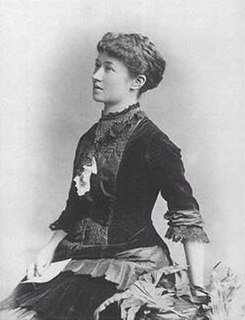
Nannie Florence Dryhurst (1856–1930) was an Irish writer, translator and nationalist.
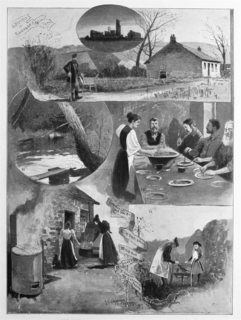
Clousden Hill Free Communist and Co-operative Colony was an anarcho-communist commune from 1895 until 1898 in Forest Hall, Newcastle upon Tyne, England. The commune was part of the back-to-the-land movement, operating a 12-acre farm under collective ownership and democratic control.
Jacques Gross, or Gross-Fulpius was a member of the Jura Federation, historian of the Paris Commune and a contributor to libertarian and free-thinker newspapers. He contributed to the creation of the newspaper Le Réveil anarchiste in Geneva under the pseudonym of Jean-qui-marche.
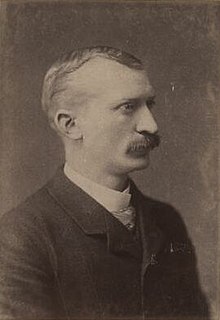
James Tochatti, was a Scottish anarchist agitator, merchant tailor, trade unionist, newspaper editor and public speaker. From 1894 to 1896 he was editor of the monthly anarcho-communist paper Liberty.














